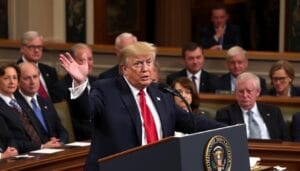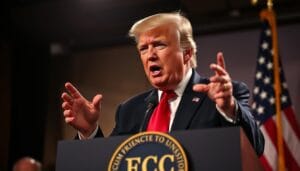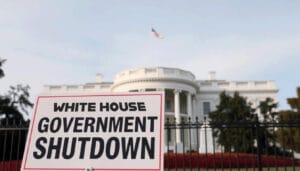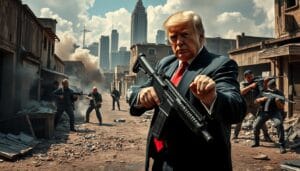Trump’s Crackdown on Drug Cartels: What You Need to Know
Explore the impact and strategies of Trump’s Crackdown on Drug Cartels and its implications for US safety and border control.
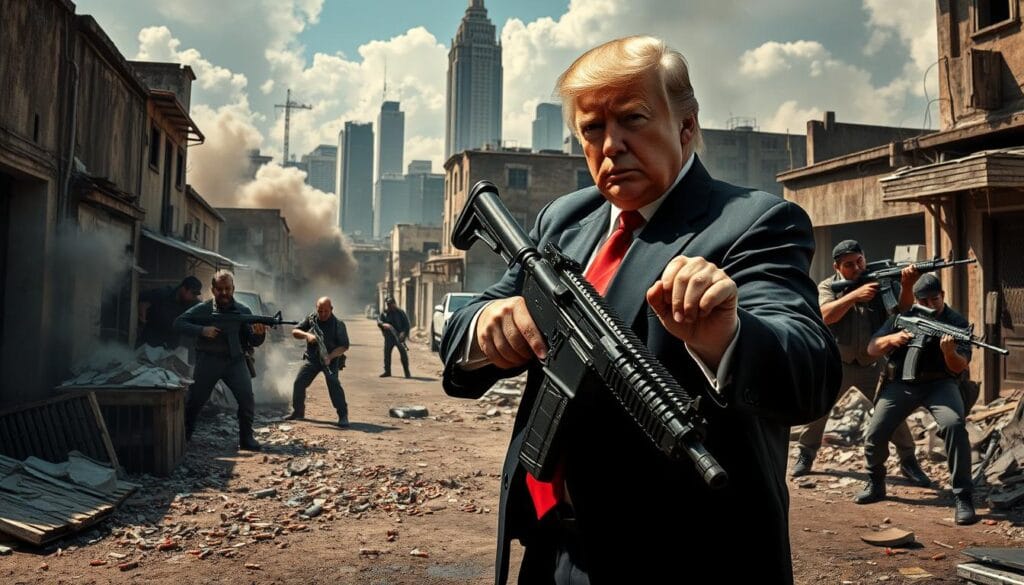
Trump's Crackdown on Drug Cartels
Trump’s Crackdown on Drug Cartels: President Donald Trump spoke from the Oval Office about a new phase in the war on drugs. He called for a Trump armed conflict with cartels and labeled suspected traffickers as unlawful combatants. This move marks a shift from traditional policing to wartime authorities.
The White House defended recent Caribbean strikes that killed 17 people on three boats. Two of these boats were linked to Venezuelan drug trafficking, including one tied to the Tren de Aragua. The Administration sees this as a matter of U.S. national security. Critics, on the other hand, see it as an overreach beyond traditional law enforcement.
On Sept. 30, 2025, Trump addressed the nation from the Oval Office. A photo by Francis Chung for Politico and Bloomberg captured the moment. His confidential notice to Congress, reported by the New York Times, argues that cartels mount armed attacks on the United States. It claims the campaign is a non-international armed conflict, opening the door to detention and military trials.
Three Caribbean strikes on September 2, September 15, and September 19 targeted alleged smugglers at sea. Legal experts warn these actions could be seen as extrajudicial killings. For a deeper rundown of the declaration and the designation of unlawful combatants, see this report on the latest developments.
Broader geopolitical pressures also loom, as Washington weighs possible drone strikes on cartel leaders and labs inside Venezuela. This could sharpen disputes with Caracas and complicate ties with Bogotá.
Trump’s Crackdown on Drug Cartels Key Takeaways
- Trump declared a non-international armed conflict and labeled suspected traffickers as unlawful combatants.
- Caribbean strikes killed 17 people, including on boats linked to Venezuela drug trafficking and the Tren de Aragua.
- A January terrorist designation of cartels underpins the legal framing and U.S. national security rationale.
- The confidential notice to Congress invites a comparison with the AUMF and possible wartime authorities.
- Legal scholars question the strikes as possible extrajudicial killings under domestic and international law.
- Future actions could expand to drone strikes in Venezuela, raising regional and diplomatic risks.
Latest Developments and Why It Matters for U.S. Policy and Security
The administration has taken steps to link home safety to actions abroad. They see new steps as a response to growing national security threats. An Oval Office statement and a confidential congressional notice set the tone. They use a non-international armed conflict to justify the use of wartime tools.
Oval Office Announcement and Confidential Notice to Congress
From the Resolute Desk, the President issued a statement and a confidential briefing to key committees. The brief calls cartels hostile nonstate armed groups. It states that their actions constitute attacks on the United States.
The brief uses the non-international armed conflict framework to explain recent missions. For more on this, see this in-depth news summary.
Designation of Cartels as Terrorist Organizations and Legal Framing
An executive order on Jan. 20 made multiple cartels and terrorist organizations. The law combines the laws of armed conflict with the doctrine of self-defense. It argues that cartel networks threaten U.S. citizens.
Officials say cross-border attacks and drug flows make certain operatives enemy combatants. This approach involves detention, targeting, and prosecution, similar to counterterrorism efforts.
Details on Caribbean Strikes and Reported Casualties
Military reports show three strikes on civilian vessels in international waters. These resulted in confirmed casualties in Caribbean incidents on Sept. 2, Sept. 15, and Sept. 19. Intelligence ties one boat to a designated group and narcotics trafficking.
Seventeen deaths were reported across the actions. Visuals are under review, and questions about evidentiary standards remain. Analysts are looking closely at how “combatant” status is defined under this framework.
| Date | Location | Target Type | Assessed Affiliation | Reported Outcome |
|---|---|---|---|---|
| Sept. 2 | Caribbean, international waters | Civilian vessel | Unspecified cartel-linked actors | 11 fatalities; vessel disabled |
| Sept. 15 | Caribbean, international waters | Civilian vessel | Designated terrorist organization | 3 fatalities; vessel and narcotics destroyed |
| Sept. 19 | Caribbean, international waters | Civilian vessel | Suspected cartel operatives | At least 3 fatalities; maritime assets neutralized |
White House Position and National Security Rationale
A recent White House statement says the actions are legal and aim to stop drug trafficking networks. Spokesperson Anna Kelly says the policy targets immediate threats and long-term deterrence.
The administration frames the strikes as self-defense and under the armed conflict designation. They aim to stop lethal flows from Venezuela and beyond. Budget and force-posture shifts are part of this strategy, as seen in a related budget outlook.
Trump’s Crackdown on Drug Cartels: What You Need to Know
The White House sees the fight against drug cartels as an armed conflict. They compare it to the post-9/11 era and use the law of armed conflict to justify military action. Critics argue that this may not meet international humanitarian law standards.
This approach could lead to detention and military trials for those seen as unlawful combatants. This has raised concerns about due process and the ethics of extrajudicial killings. There’s also a call for more oversight from Congress.
Experts say the International Committee of the Red Cross has strict criteria for determining what constitutes an armed conflict. If cartels are seen as loose cells, it’s hard to prove they meet these standards. Some question if drug smuggling is enough to justify the armed conflict label.
Supporters point to signs of success on the ground. A recent report revealed that smuggling prices have increased, and a Sinaloa leader acknowledged the challenges posed by more complex border crossings. This is detailed in a CNN interview summary. Yet, others argue this data doesn’t settle the debate on extrajudicial killings or the comparison to the AUMF.
Legal experts are divided on the scope and safeguards of this approach. Some worry that expanding lethal authority without clear rules could undermine the law of armed conflict. This has raised concerns about due process and the need for stronger congressional oversight.
Key question: Can the government demonstrate sustained hostilities and an organized command structure that meet international humanitarian law standards? Without clear transparency, the designation of armed conflict will face legal challenges and public scrutiny.
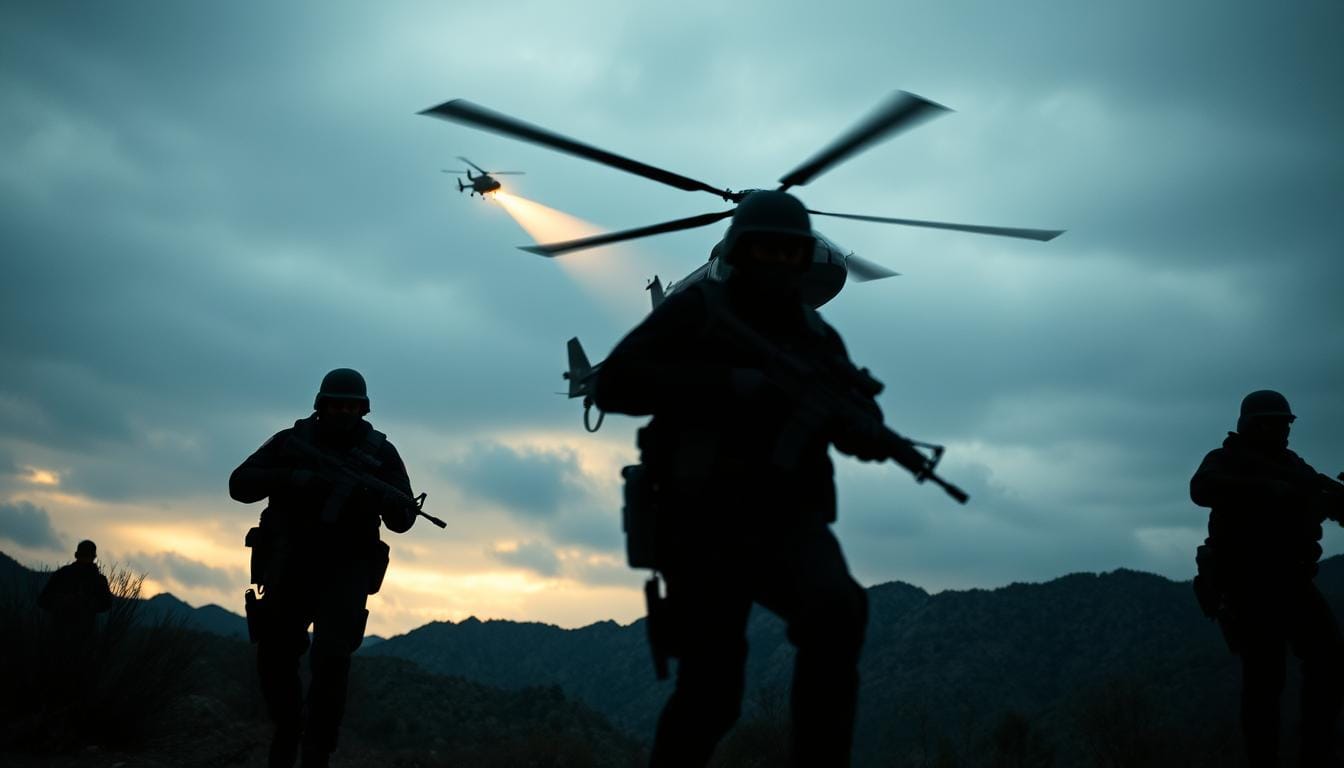
Policy watchers also look at judicial reactions. Recent coverage of Chief Justice John Roberts’s approach in federal disputes, noted in a high-profile ruling, shows how courts might view these claims. This perspective sheds light on the AUMF comparison, the debate on extrajudicial killings, and the push for congressional oversight.
Legal and Geopolitical Fallout Across the Americas
The policy shift has sparked a significant debate in international law and heightened tensions with Venezuela. Officials say the strikes are defensive, but neighbors are concerned about trade, air safety, and diplomatic implications. Now, sanctions and tariffs are part of the security planning, making things more complicated for Washington and the region.
Armed Conflict Classification and “Unlawful Combatants” Debate
Calling cartels nonstate forces is a big test of international law. The term unlawful combatants means detention and targeting, like after 9/11. But it’s unclear which groups are covered and how suspects are found.
Supporters say cross-border attacks justify force. Critics argue that there’s insufficient evidence of command structure and sustained intensity. This gap leads to a big debate in international law, warning of flexible standards and unclear lines between crime and war.
Expert Reactions on Domestic and International Law
Legal scholars are divided on the issue. Matthew Waxman fears open-ended conflict that could harm international norms. Geoffrey S. Corn believes drug sales don’t meet the armed attack criteria.
Ryan Goodman thinks the first strike was illegal under Pentagon rules. Brian Finucane questions if networks like Tren de Aragua are organized armed groups. He notes Venezuelan authorities see the group as a threat, not a proxy of Nicolás Maduro.
This debate widens the U.S.-Colombia rift and complicates future cases tied to the Cartel of the Suns allegations. For more on legal pressures, readers can follow the court battles and presidential legal exposure.
Escalation Toward Venezuelan Targets and Possible Drone Strikes
After maritime strikes in early and mid-September, the Pentagon moved ships and aircraft to the Caribbean. Plans for drone strikes in Venezuela are in the works, targeting leaders, members, and drug labs. Officials say a decision could come in weeks.
Venezuela tensions grew as casualties increased at sea. The talk of drone strikes in Venezuela raises concerns about airspace, civilian safety, and evidence standards. The Administration says it’s not aiming for regime change, but internal pressure campaigns, sanctions, and tariffs continue.
Regional Responses: Venezuela’s Military Posture and Colombia’s Pushback
Caracas mobilized militia forces and ordered F-16 flyovers near U.S. vessels after the first strike. Nicolás Maduro signed security decrees and accused Washington of provocation, even as he floated the possibility of direct talks. Washington dismissed the outreach and tightened measures tied to oil exports.
At the U.N., Gustavo Petro’s UN speech challenged the legality of the maritime strike and urged accountability. The visa revocation of Colombia’s president deepened the U.S.-Colombia rift, while decertification strained counternarcotics ties.
Experts warn that using force in Venezuela could strengthen Maduro’s support and lead to reprisals against perceived collaborators. Regional actors also consider the Cartel of the Suns allegations and economic fallout as they decide how to stand with Washington.
| Issue | Key Actors | Legal Stakes | Geopolitical Risks | Current Signals |
|---|---|---|---|---|
| Conflict Classification | U.S., ICRC, regional jurists | noninternational armed conflict threshold, status of persons | Norm erosion: precedent for cross-border force | Ongoing international law critique over scope and evidence |
| Targeting Policy | Pentagon, DOJ | Unlawful combatants, due process, accountability | Civilian harm; mission creep | Plans for drone strikes in Venezuela under review |
| Venezuela Response | Nicolás Maduro, FANB | Self-defense claims; sovereignty | Escalation at sea and in the airspace | F-16 flyovers; mobilized militia units |
| Colombia Relations | Gustavo Petro, State Department | Diplomatic immunity, speech at U.N. | U.S.-Colombia rift; counternarcotics breakdown | Visa revocation; decertification |
| Economic Pressure | Treasury, energy traders | Sanctions and tariffs compliance | Supply shocks; illicit finance shifts | Penalties on Venezuelan oil buyers |
| Criminal-Military Nexus | Cartels, alleged state-linked actors | Cartel of the Suns allegations | Regional instability; proxy dynamics | Competing claims on state involvement |
Trump’s Crackdown on Drug Cartels Conclusion
The Trump drug war strategy has shifted from courts to combat zones. By calling cartel violence a war, the White House uses special powers. This change has big effects on U.S. policies.
The administration sent a confidential notice to Congress regarding this matter. This armed conflict declaration aims for more authority. But it also raises concerns about international law and oversight.
The first action was dramatic: three suspected drug boats were destroyed, and 17 people died. Supporters argue that it’s about keeping the border secure. Critics worry about the lack of due process and if fighting drugs is a war.
Legal experts fear this could lead to more drone strikes and wider use of force. They worry it could blur the lines of what’s considered a war zone.
The situation is becoming increasingly complex, with the Venezuelan crisis looming. Any increased action, like drone strikes in Venezuela, could lead to conflicts with Maduro’s forces. This could also affect Colombia and regional security.
Diplomatic tensions could rise, leading to more aggressive actions. The trust between countries will depend on how these actions are justified and controlled.
At home, lawmakers are pushing for more information and limits on this approach. This echoes debates after 9/11 about war powers. The future depends on how Congress responds to these demands.
The implications are enormous, affecting border security, public health, and the rules governing the use of force. The shift in policy is being closely watched, with both sides of the aisle weighing in. This is seen in media coverage and debates about power and secrecy.
Trump’s Crackdown on Drug Cartels FAQ
What did President Donald Trump announce about drug cartels on Sept. 30, 2025?
President Trump said the U.S. is now in a formal “armed conflict” with drug cartels. This was revealed in a secret notice to Congress, as reported by the New York Times. The notice calls cartels “nonstate armed groups” and labels suspected smugglers as “unlawful combatants.”
How does the Oval Office notice change U.S. policy?
The notice alters the U.S. approach to drug interdiction. It now sees it as a non-international armed conflict. This change allows for actions like lethal targeting, detention without trial, and military courts, similar to post-9/11 actions against Al-Qaeda.
Which cartels were designated as terrorist organizations?
An executive order on Jan. 20 named several cartels as terrorist groups. The notice doesn’t list specific names. Critics argue that this lack of detail raises concerns about due process and complicates congressional oversight.
What happened in the Caribbean Sea strikes that killed 17 people?
U.S. forces attacked three civilian vessels in international waters on Sept. 2, Sept. 15, and Sept. 19. These strikes killed 11, 3, and 3 people, respectively. The Administration claims the Sept. 15 vessel was linked to a designated group, but legal experts question the evidence and legality.
Why are legal scholars calling the strikes likely illegal?
Experts like Matthew Waxman and Geoffrey S. Corn say drug smuggling doesn’t meet the criteria for an “armed attack” under international law. They also argue that many cartels don’t qualify as organized armed groups under the International Committee of the Red Cross.
What is the Administration’s national security rationale?
The White House states that the actions comply with the laws of armed conflict. They defend the U.S. against “deadly poison” from drug shipments. They frame the campaign as self-defense to deter future narcotics-linked deaths.
How does the “unlawful combatants” status affect targets?
The label allows for lethal force against suspected cartel members not posing an imminent threat. It also justifies detention without trial and the use of military commissions. Critics worry about misidentification and extrajudicial killings.
Do the ICRC criteria support classifying this as armed conflict?
The ICRC requires organized armed groups and intense hostilities. Analysts say groups like Venezuela’s Tren de Aragua don’t meet these criteria due to their decentralized and loosely organized nature.
What evidence gaps are raising red flags?
The notice lacks details on which cartels or individuals are combatants and how targets are verified. The video for the Sept. 15 strike doesn’t clearly show contraband. Ryan Goodman called the first strike a “murder” under Pentagon standards.
How are lawmakers responding?
Sen. Jack Reed warned against secret wars and demanded transparency. Sen. Rand Paul condemned extrajudicial killings and warned against executing suspects without trial. Vice President J.D. Vance defended lethal action against cartel members as a military responsibility.
Is Venezuela a focus of the campaign?
Yes. All three lethal strikes hit Venezuelan vessels in international waters. U.S. military planners have prepared drone strikes inside Venezuela against cartel leaders, members, and drug labs. The White House denies seeking regime change, even as some aides reportedly push to intensify pressure on Nicolás Maduro.
How has Venezuela reacted?
Caracas mobilized militia troops, flew F-16s over a U.S. Navy ship after the Sept. 2 strike, and issued decrees to ready defense powers. Maduro accused Washington of provocation but also offered talks. The U.S. doubled the reward for information leading to his arrest to million and imposed penalty tariffs on buyers of Venezuelan oil.
What is Colombia’s position?
President Gustavo Petro condemned the strikes at the U.N., calling for criminal proceedings against U.S. officials. He said the boat passengers were poor youths, not traffickers. After he joined a pro-Palestinian demonstration and urged U.S. soldiers to disobey orders, the U.S. revoked his visa and decertified Colombia as a drug-war partner.
Could drone strikes inside Venezuela escalate tensions?
Yes. Analysts like Anibal Sanchez Ismayel warn such strikes could rally public support around Maduro, trigger crackdowns on perceived collaborators, and raise risks of military incidents in the Caribbean. The Pentagon has surged ships, aircraft, and troops to the region.
How does the Administration justify treating overdoses as an armed attack?
The notice claims cartels “illegally and directly cause the deaths of tens of thousands of American citizens each year,” casting drug trafficking as an armed attack on the U.S. Legal experts say this stretches self-defense doctrine and could erode norms governing the use of force.
What are the implications for civil liberties and due process?
Expanding wartime powers to criminal networks may allow detention without trial and military prosecutions. Without transparent criteria for identifying combatants, it risks wrongful targeting, limited judicial review, and “forever war” dynamics.
How might this reshape U.S. foreign policy in the Americas?
It strains ties with Venezuela and Colombia, invites legal disputes at the U.N., and could set precedents other governments cite to justify cross-border force. Analysts warn it may weaken U.S. credibility and hand diplomatic leverage to rivals such as China.
What does Congress need to decide next?
Lawmakers face choices on transparency, oversight, and statutory authority. They must decide whether to demand evidence for past strikes, limit executive war powers, or craft new authorization language. Their response will shape the scope and duration of the campaign.
How does this compare to counterterrorism efforts following the 9/11 attacks?
The notice borrows non-international armed conflict frameworks used against Al-Qaeda, but applies them to criminal cartels. Critics argue that the shift blurs lines between war and policing, expanding lethal authorities to contexts not traditionally covered by the law of armed conflict.
What risks does the U.S. face if it normalizes extraterritorial strikes on suspected traffickers?
Risks include civilian harm, reciprocal actions by other states, judicial challenges, and reduced cooperation from regional partners needed for interdiction, extradition, and intelligence sharing.
Where can people find reliable updates and documentation?
The New York Times reported on the confidential notice. Official statements come from the White House, the Pentagon, and congressional committees. Legal analysis appears in commentary by scholars such as Matthew Waxman, Geoffrey S. Corn, Ryan Goodman, and Brian Finucane.

